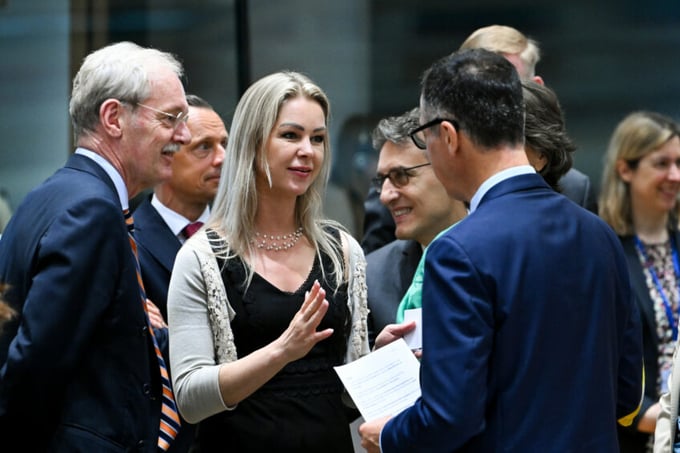November 26, 2025 | 06:43 GMT +7
November 26, 2025 | 06:43 GMT +7
Hotline: 0913.378.918
November 26, 2025 | 06:43 GMT +7
Hotline: 0913.378.918

Femke Wiersma (second, left), the new minister of agriculture, claims not to have a choice in introducing the policies. Photo: Boerderij.
Last November, general elections resulted in a substantially more right-wing government, which had sparked the hope in the Dutch agricultural sector for more favourable policies. Especially the fact that also the Farmer-Citizen Movement (BBB) is now part of the government coalition was thought to be reason for optimism. One reason why the BBB managed to attract strong support was because the previous’ government’s ambition to reduce the number of livestock, having severe consequences for the countryside.
The new coalition, however, is adamant that the number of animals needs to come down – with one difference, that it has chosen a slightly less drastic approach. The new policy aims to reduce livestock numbers by reducing the permit quantity on farms. Every time a farm will change ownership outside the family, a new permit will be for 70% of the original cattle capacity, 75% of the original pig capacity and 85% of the original poultry capacity. In addition, new buying-out regulations will be introduced.
The reason behind the policy is related to European legalisation around manure and water quality. Femke Wiersma, the new minister of agriculture, claims not to have a choice in introducing the policies. In an interview with sister title Boerderij, she said, “I would have preferred not to do this, but there are agreements with Brussels I have to comply with.”
With regard to manure,the Netherlands have been able to perform for years using an exception to apply more manure to the lands than its neighbouring countries. The exception was known as the “derogation,” which the Netherlands obtained in 2006. The country convinced Brussels that its many meadows can deal with the nitrates very quickly. That is why for all those years, Dutch farmers have been allowed to apply 230-250 kg nitrogen/ha on their lands instead of the 170 kg/ha which is part of the European nitrate directive. Main goal of this directive is to protect fresh water quality.
As from January 1, 2026, however, this exception is no longer permitted by Brussels. That is why the Netherlands have to find a way to reduce the amount of manure it produces.
Wiersma does have the ambition to go and talk to Brussels to see whether a new derogation can be achieved. She does add, however, “With our ambition to go and make new agreements with Brussels, it wouldn’t help now not to meet our targets. That could lead to an immediate withdrawal of the current derogation, making things considerably worse, even.”
Minister Wiersma does meet the country’s farmers by reducing the area of “derogation free zones,” these were strips of farmland close to natural areas. In the original plans those were 250 m wide, they will be reduced to 100 m wide. In practice this means that farmers will have more land on which manure can be used.
It remains to be seen whether or not the new plans will satisfy “Brussels.” Even though the previous’ government’s plans were felt to be too drastic by the Netherlands’ agricultural industry, the country’s Council of State however said even those weren’t sufficient. It remains to be seen what the council will have to say about the new plans.
The plan to reduce the country’s pig, poultry and cattle populations are a different programme than the relaxation of the nitrogen rules, which were announced last week. The abolishment of those plans, felt to be too stringent by many, were welcomed in the world of agriculture.
(PP)

(VAN) Brazil's COP30 presidency pushed through a compromise climate deal on Saturday that would boost finance for poor nations coping with global warming but that omitted any mention of the fossil fuels driving it.

(VAN) Poultry farmers in the UK have been warned that they could face one of the worst winters yet for bird flu.

(VAN) Prices of main-crop paddy have risen sharply, with jasmine rice hitting 16,100 baht per tonne — the highest level in years.

(VAN) In Brazil, FAO unveiled a series of reports and initiatives showing how sustainable agrifood systems are a solution to the climate crisis.

(VAN) With names like neodymium and dysprosium, rare-earth elements sound exotic — and their perceived scarcity has only added to the mystique.

(VAN) In a new study published in Trends in Biotechnology, researchers used a gene-editing technology called CRISPR to increase a fungus's production efficiency and cut its production-related environmental impact by as much as 61%- all without adding any foreign DNA.

(VAN) A top official in Beijing’s Cop delegation says China is committed to clean energy – but US’s absence is a problem.